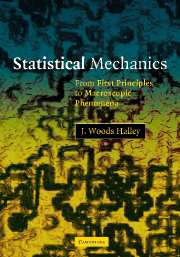Book contents
- Frontmatter
- Contents
- Preface
- Introduction
- Part I Foundations of equilibrium statistical mechanics
- Part II States of matter in equilibrium statistical physics
- 5 Perfect gases
- 6 Imperfect gases
- 7 Statistical mechanics of liquids
- 8 Quantum liquids and solids
- 9 Phase transitions: static properties
- Part III Dynamics
- Appendix: Solutions to selected problems
- Index
6 - Imperfect gases
Published online by Cambridge University Press: 05 June 2012
- Frontmatter
- Contents
- Preface
- Introduction
- Part I Foundations of equilibrium statistical mechanics
- Part II States of matter in equilibrium statistical physics
- 5 Perfect gases
- 6 Imperfect gases
- 7 Statistical mechanics of liquids
- 8 Quantum liquids and solids
- 9 Phase transitions: static properties
- Part III Dynamics
- Appendix: Solutions to selected problems
- Index
Summary
Here we introduce interactions between particles, beginning with the classical case. In practice we will call a system an imperfect gas when it is sufficiently dilute so that an expansion of the pressure in a power series in the density converges reasonably quickly. This series is called the virial series and we will introduce it in this chapter. This definition of an imperfect gas thus can depend on the temperature. If the power series in the density does not converge we may refer loosely to the system as a liquid, as long as it does not exhibit long range order characteristic of various solids and liquid crystals. The experimental distinction between a gas and a liquid will be discussed more precisely in Chapter 10.
We will develop the virial series for a classical gas in two different, but equivalent, ways here. In the first method we develop a series for the partition function Z using the grand canonical distribution. By making a partial summation of this series we get a series in the fugacity. In the second method we study a series for the free energy F = −kBT ln Z and use the canonical ensemble. Though the two methods are equivalent, we discuss them both in order to provide an opportunity to introduce several concepts common in the statistical mechanical literature.
The classical virial series will clarify more precisely than we were able to do in the last two chapters the conditions under which a gas can be treated as perfect or ideal.
- Type
- Chapter
- Information
- Statistical MechanicsFrom First Principles to Macroscopic Phenomena, pp. 85 - 124Publisher: Cambridge University PressPrint publication year: 2006



